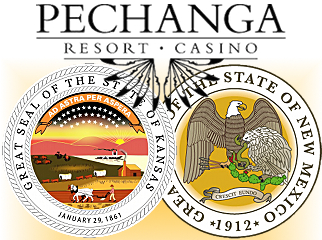 An attempt to criminalize online gambling by the state of Kansas has gone down to defeat, but only because lawmakers were less interested in revoking legislation allowing slots at state racetracks. On Tuesday, the Kansas state Senate approved an amendment to a proposed casino gambling bill that would have criminalized the placing of online wagers by state residents, leaving them open to potential prison stints of up to six months and fines up to $1k. The amendment, written by Republican Jacob LaTurner, passed by a vote of 26-11.
An attempt to criminalize online gambling by the state of Kansas has gone down to defeat, but only because lawmakers were less interested in revoking legislation allowing slots at state racetracks. On Tuesday, the Kansas state Senate approved an amendment to a proposed casino gambling bill that would have criminalized the placing of online wagers by state residents, leaving them open to potential prison stints of up to six months and fines up to $1k. The amendment, written by Republican Jacob LaTurner, passed by a vote of 26-11.
However, the bill itself – which was intended to lower barriers to the construction of a casino in the southeast corner of the state but would also have prevented state racetracks from hosting slot machines until the year 2032 – was later defeated by a vote of 24-15. The state’s three horse- and dog-racing tracks have been shuttered for years as their owners protested the size of their cut of slots revenue, which they feel is insufficient to allow them to turn a profit. Proponents of the casino bill had argued that revoking the tracks’ right to host slots would amount to a reduction of gambling, but since none of the tracks are actually operating, gambling opponents in the Senate didn’t see how taking nothing from nothing amounted to a reduction in anything.
NEW MEXICO TRIBAL COMPACT WOULD EFFECTIVELY BAR ONLINE GAMBLING
New Mexico is also looking to keep online gambling at bay, and it’s enlisted the local Navajo Nation as allies. The Navajos are negotiating a new gambling compact with the state, and the proposed language would allow the tribe to withhold the state’s share of slot machine revenue if state legislators pass laws permitting online poker or any other form of internet casino gambling.
Under the proposed new compact, the Navajos would agree not to offer online gambling unless the state or the federal government passed laws authorizing such activity off-reservation. In the unlikely event that the feds actually passed such a law, the Navajos would then be allowed to renegotiate the terms of their slots revenue-sharing deal with the state. The existing compact restricts non-tribal slots operation to racetracks and fraternal/veterans groups, but there is no such restriction on poker. If the Navajos were to launch their own online gambling business, it would be subject to the same revenue sharing agreement with the state, but poker revenue would be excluded.
A spokesperson for Gov. Susana Martinez told the Albuquerque Journal that the proposal was intended “to discourage the adoption of internet gaming in the state, while ensuring that, if internet gaming is adopted, revenue sharing continues in light of any new benefit/detriment to [the Navajos].” The governor is convinced the tribe’s brick-and-mortar gaming joints “will provide for more jobs and better serve the interests of New Mexico economic development” than would online gambling. A joint Committee on Compacts has approved the new compact, but legislators didn’t receive the final text until a week before their last session ended March 16, so no vote has been scheduled.
PECHANGA.NET, SPECTRUM GAMING GROUP TO HOST ‘NO TRIBE LEFT BEHIND’ CONFERENCE
There’s no question that US tribes are split on whether online gambling will prove to be boon or bust for their established brick-and-mortar operations. To help clear the air, native news site Pechanga.net and gaming research firm Spectrum Gaming Group will host a conference dedicated to illuminating the opportunities and challenges online gambling presents for tribes. Indian Country Online: The 2013 Congress will go down at the Pechanga Resort and Casino in Temecula, California on June 3-4. Pechanga.net owner (and wicked guitar player) Victor Rocha said the conference was his way of “pulling bck the curtains and demonstrating that every tribe in the country can have a role and opportunity to benefit in some real and direct way” from iGaming and e-commerce. Registration info is available at www.Indiancountryonline.net.
